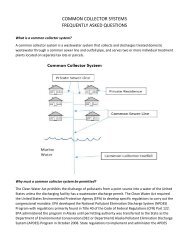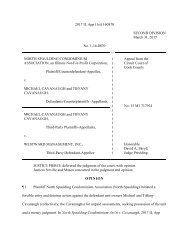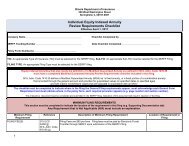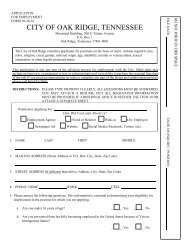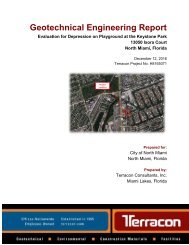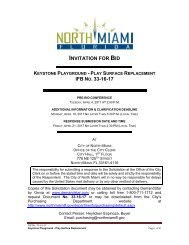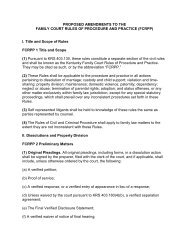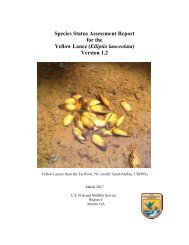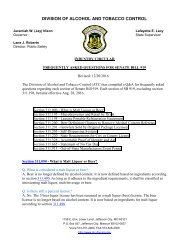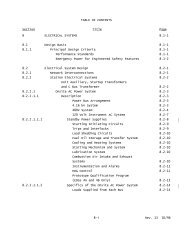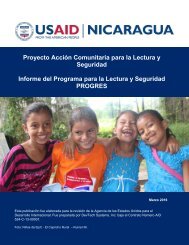COMMUNITY DISPUTE RESOLUTION IN TIMOR-LESTE
PA00MJQC
PA00MJQC
Create successful ePaper yourself
Turn your PDF publications into a flip-book with our unique Google optimized e-Paper software.
with locally. On this topic it may be that suku council members provide what they believe to be the<br />
“correct” answer regardless of practice, and that information could be more reliably obtained from<br />
other sources, including suku record books or community members themselves. As explained further<br />
below (see section III), misconceptions about the permissibility of dealing with domestic violence in<br />
community dispute resolution may be hampering the correct reporting of how such cases are handled.<br />
In addition to dealing with conflicts between individuals and families, community leaders also deal<br />
with another type of case: instances in which a local regulation is said to have been violated. In<br />
addition to long-standing customs regulating behavior – which would ordinarily have been unwritten<br />
– a number of communities are now adopting written codes of behavior which attach sanctions to<br />
their violation. Frequently they are referred to as tara bandu. 14 However, while such local regulations<br />
may incorporate elements of lisan (customary spiritual law) in their substance and the procedures for<br />
their adoption, they may also display various features which depart from traditional systems. In some<br />
instances, these local regulations are adopted at the level of suku 15 (or even aldeia 16 ), but in others<br />
they cover a larger area such as an Administrative Post 17 or even a whole Municipality. 18<br />
Typically, local regulations purport to do one or more of the following: regulate behaviour impacting<br />
the environment; require appropriate management of livestock; set limits on cultural activities and<br />
expenditures on them; and regulate or prohibit certain other types of conduct (for example gambling,<br />
assaults, sexual relations.) In many cases (though not all) specific sanctions are established in the<br />
written regulations. Published research to date on these local regulations has been limited 19 and does<br />
not consider the means that are used to adjudicate alleged violations when they occur. Information<br />
gathered for this Brief suggests that adjudication often occurs at the suku level before members of<br />
the suku council. In some areas local regulations are also enforced with the assistance of informal<br />
police appointed by communities for this purpose: under the Ermera-wide “tara bandu”, these police<br />
are referred to as kablehan, 20 and play a prominent role.<br />
Number of community–based procedures<br />
No comprehensive data exists to indicate the proportion of disputes in Timor-Leste which are resolved<br />
through community mechanisms. Interestingly, the Ba Distrito/Belun research suggests that most<br />
sukus deal with less than one dispute per month. However, this may merely demonstrate that the<br />
great majority of cases are resolved at the aldeia level and therefore never reach the suku.<br />
Research carried out by The Asia Foundation in 2015 indicated that in the event of a crime, 54 percent<br />
of respondents first sought assistance from their community, their traditional leaders or their suku or<br />
14<br />
Now commonly used to denote a type of local-level social agreement to regulate behaviours, the term was<br />
originally used in some parts of Timor to denote a specific traditional process for regulating conduct in<br />
communities. For discussion of the term, see: Tara Bandu: Its role and use in community conflict prevention in<br />
Timor-Leste, The Asia Foundation and Belun, June 2013, p10.<br />
15<br />
For example: Lei Tradisiona (Tarabandu) Suco Vatu-Vou; Tara Bandu for Suku of Balibo Vila.<br />
16<br />
For example: Tara Bandu: Gestaun Rekursu Tasi no Tasi Ninin ho Baze Komunidade, Aldeia Adara<br />
17<br />
For example: Tara Bandu for the Administrative Post of Maubisse; Lei Domestika Suku 11 Sub-Distriu Aileu<br />
Vila.<br />
18<br />
For example, for the Municipality of Ermera: Akta no Regulamentu Tara Bandu Distritu Ermera, 27 February<br />
2012.<br />
19<br />
Tara Bandu: Its role and use in community conflict prevention in Timor-Leste, The Asia Foundation and Belun,<br />
June 2013.<br />
20<br />
The kablehan are not regulated by any formal laws or regulations. Information provided during this research<br />
by community leaders indicates that they are appointed within communities and are invariably men. They do<br />
not receive salaries for their work, but as explained below, in some cases may receive payments based on their<br />
work in specific cases. It is noteworthy that kablehan appear to be far more numerous than the community<br />
police working within the PNTL. Whereas a suku will usually have one community-based PNTL officer, sukus<br />
visited for this research had between 10 and 30 kablehan each.<br />
5



